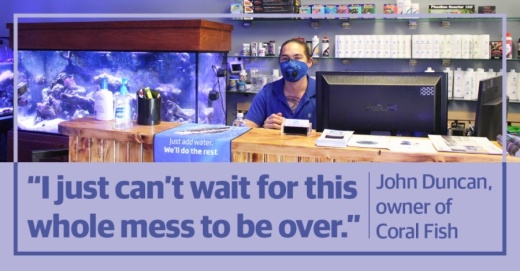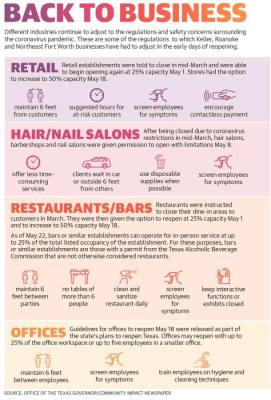Just four days after Texas restaurants reopened at 25% capacity, Gov. Greg Abbott announced that salons and barbershops could reopen May 8, and gyms, rec centers and other exercise facilities could reopen May 18 if proper social distancing measures are in place.
“As businesses start to reopen, it’s important that we understand where they are now,” said Robert Sturns, director of economic development for the city of Fort Worth. “Some businesses have been pretty creative in working to maintain operations, some might still be closed and some might be in transition or somewhere in between.”
As the manager of a small, locally owned business, Rick Rice said the goal for Soccer Post in Keller is to be able to take care of customers in the surrounding area. The store is focused on simplicity of service, he said, and is only allowing one or two patrons in at a time.
“We are keeping a distance and asking customers who come in and out to sanitize,” Rice said, pointing to a bottle of hand sanitizer near the front door. “Products that get touched are also sanitized.”
Lisa Stence, owner of Merle Norman Cosmetic Studio in Keller, said she hopes the loosening of restrictions will allow more people to leave the house once again. She said she expects the studio to allow five people at a time at most.
“We are in strange times now,” she said. “We’ve been doing porch deliveries for mail orders, but a lot of ladies are not wearing makeup right now because they’re staying home.”
Nationwide, sales of retail and food services plummeted in March and April amid social distancing and stay-at-home orders. Data from the U.S. Census Bureau released May 15 indicates a 16.4% drop in sales from March to April.
Food and retail sales in April of $403.9 billion are also 21.6% lower than sales in April 2019, according to census bureau data. Sales were also down 8.3% in March from the previous year to $483.5 billion.
“Either way, business operations will be impacted, and their employees will be affected,” Sturns said. “We’re trying to determine where some of those stress points are so we know where we should focus our efforts.”
The pandemic’s effects on employees have also been noticeable. More than 6,500 residents within the four ZIP codes that make up Community Impact Newspaper’s Keller-Roanoke-Northeast Fort Worth coverage area filed for unemployment insurance from March 18-April 18, according to data from the Texas Workforce Commission.
During the same time period, Tarrant County had 91,089 unemployment insurance claims, which accounts for roughly 4.41% of the county’s total population of 2,064,380. Denton County had 40,336 unemployment insurance claims, which accounts for roughly 4.68% of the county’s total population of 861,357.
“The COVID-19 pandemic has been a difficult time for all of our business community and, especially, our small businesses,” said Michael Talley, Denton County’s director of economic development.
City and countywide efforts have been made to mitigate the economic impact of COVID-19 on local businesses. The cities of Fort Worth and Keller have each launched business grant programs, as has Denton County.
The Fort Worth Small Business Grant Program provides grants worth up to $5,000 for expenses, such as mortgage or rent, inventory, working capital, payroll and marketing.
Keller’s “Beyond the Mask” initiative could raise up to $350,000 for local businesses, according to Keller Director of Economic Development Trina Zais.
Denton County OPEN is being funded by $2.2 million of non-tax payer dollars, and the county will give individual grants to businesses based on need, eligibility, number of employees and the extent of loss experienced due to full or partial closure, according to officials.
“We believe this program will assist our local businesses as they begin to reopen,” Talley said.
Coral Fish and Beyond in Keller has been continuing its operations with increased precautions since March, owner John Duncan said.
The store is classified as essential because it provides pet food and other necessary products for pet health. The store is also adhering to 25% capacity requirements, he said.
“We’re just being very careful when customers come in, but they still have to feed their fish,” Duncan said. “I just can’t wait for this whole mess to be over.”






